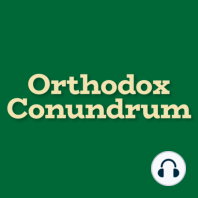39 min listen

The Present and Future of Religious Zionism (Part One): Settlements, a Palestinian State, Tanach as History or as Prophecy for Today, and More (198)
The Present and Future of Religious Zionism (Part One): Settlements, a Palestinian State, Tanach as History or as Prophecy for Today, and More (198)
ratings:
Length:
62 minutes
Released:
Mar 11, 2024
Format:
Podcast episode
Description
In some recent episodes of this podcast, Scott and his guests have discussed numerous issues relevant to the Religious Zionist world, including some of the ways that Religious Zionism differs from Modern Orthodoxy. But Religious Zionism is not a monolith; there are many different paths within Religious Zionism, and the differences between these paths can sometimes be vast. For example, the Mafdal - that is, Mifleget Dati Leumi, the old Religious Zionist Party which dominated Religious Zionist politics for decades - was, during the Six Day War, perhaps the most dovish and anti-war of all the parties in the Labor-led government. Today, in contrast, the dominant ideology within Religious Zionism is associated with the philosophy of rabbis like Rav Zvi Yehuda Kook and others who founded the settlement movement. But even though modern political Religious Zionism is generally associated with the right or even the far right on the Israeli political spectrum, the other strains within Religious Zionism still exist, albeit less so in the political arena. In order to discuss the future of Religious Zionism, Scott invited Daniel Goldman and Rabbi Elie Mischel to discuss it on the Orthodox Conundrum. But the issue of settlements and the question of a Palestinian State took up so much time that they decided to make this episode Part One, and deal with other pressing issues in Part Two. So this episode largely deals with different attitudes towards the maintenance and expansion of settlements in the West Bank, the issue of whether to create a permanent civilian Jewish presence in Gaza, the future of the Palestinians who live in the West Bank and Gaza and whether that future should include an independent Palestinian state, questions around the democratic character of Israel and whether Israel should be bound by international law, whether to relate to Tanach as history or as a practical guide, and much more. Please listen to and share this podcast, and let us know what you think on the Orthodox Conundrum Discussion Group on Facebook (https://www.facebook.com/groups/432020081498108). Check out the Orthodox Conundrum Commentary on Substack and get your free subscription by going to https://scottkahn.substack.com/. Thanks to all of our Patreon subscribers, who have access to bonus JCH podcasts, merch, and more - we appreciate your help, and hope you really enjoy the extras! Visit the JCH Patreon site at https://www.patreon.com/jewishcoffeehouse. Check out https://jewishcoffeehouse.com/ for the Orthodox Conundrum and other great podcasts, and remember to subscribe to them on your favorite podcast provider. Also visit https://www.jchpodcasts.com/ to learn all about creating your own podcast. Music: "Happy Rock" by bensound.com
Released:
Mar 11, 2024
Format:
Podcast episode
Titles in the series (100)
Interview with Rabbi Asher Lopatin, President of Yeshivat Chovevei Torah (Episode 2) by Orthodox Conundrum